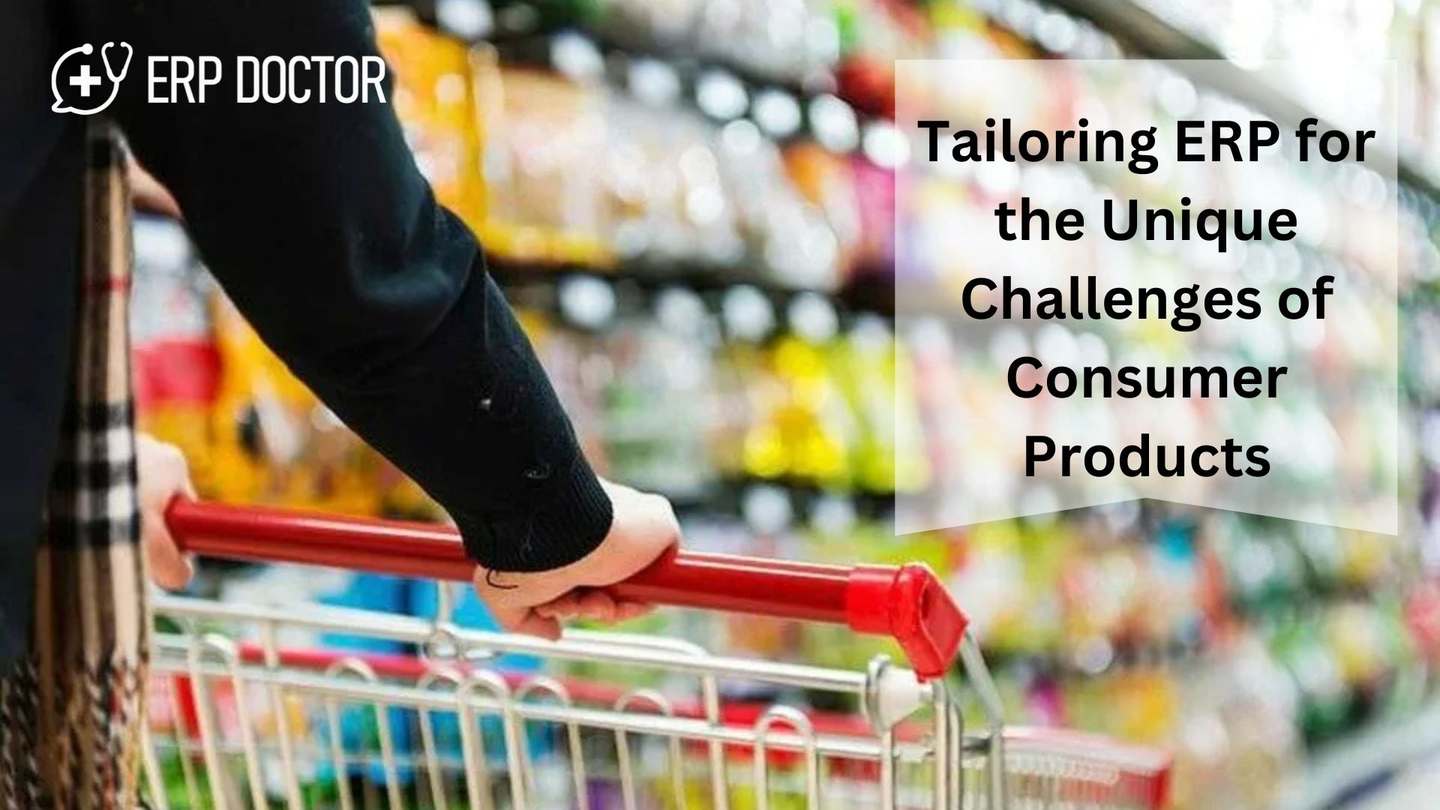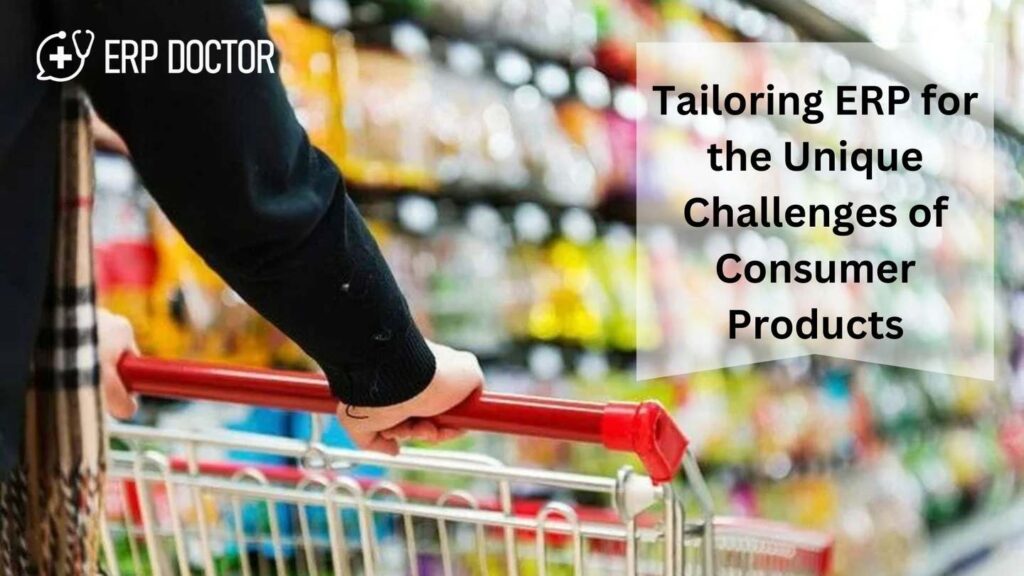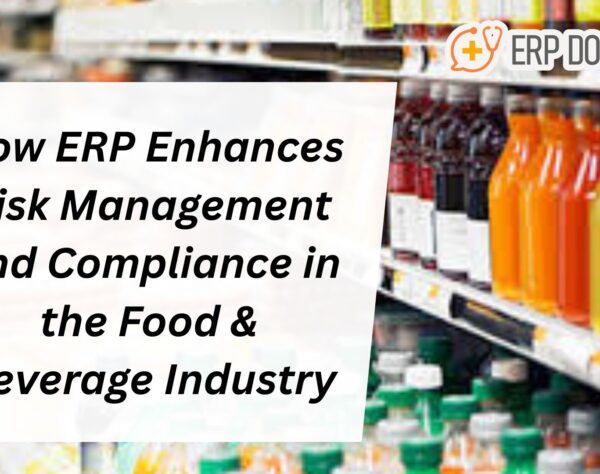
Tailoring ERP for the Unique Challenges of Consumer Products

Driving Efficiency: Why ERP is Key for Consumer Product Companies
In today’s fast-paced and highly competitive consumer market, businesses face the constant challenge of meeting ever-evolving consumer demands while effectively managing their operations efficiently. For companies in the diverse consumer products sector, the right technology can make all the difference. Enter ERP, a powerful solution meticulously tailored specifically for small to medium-sized enterprises (SMEs) in this dynamic industry. In this blog post, we will explore how ERP for Consumer Products can significantly enhance operations, improve decision-making processes, and drive sustainable growth.
What is ERP?
ERP is an integrated enterprise resource planning (ERP) solution specifically designed to streamline critical business processes across various essential functions, including finance, sales, customer relationship management (CRM), and inventory management. It offers a comprehensive suite of powerful tools that help organizations manage their operations in a cohesive and efficient manner, ultimately leading to improved productivity and enhanced overall performance.
Key Features of ERP
- Financial Management: Track financial performance in real-time, manage budgets, and streamline accounting processes.
- Sales and Customer Management: Improve customer relationships through effective sales processes and customer service management.
- Inventory and Distribution Management: Optimize inventory levels, track stock movements, and manage supply chain logistics.
- Reporting and Analytics: Gain insights into business performance with advanced reporting tools that enable informed decision-making.
Why ERP for Consumer Products?
The consumer products industry is unique, with specific challenges such as fluctuating consumer demands, seasonal trends, and complex supply chains. ERP software for Consumer Products is specifically designed to address these challenges, offering features that cater to the needs of this sector.
1. Enhanced Demand Forecasting
With ERP for Consumer Products, businesses can leverage historical sales data to forecast demand accurately. This capability allows companies to align production with consumer needs, reducing waste and improving customer satisfaction.
2. Streamlined Supply Chain Management
In the consumer products industry, managing a robust supply chain is essential. ERP provides tools for effective supplier management, allowing businesses to track supplier performance, manage contracts, and optimize procurement processes. This results in a more resilient supply chain that can adapt to changes in demand.
3. Improved Inventory Control
Effective inventory management is crucial for consumer product companies. ERP software for Consumer Products enables businesses to maintain optimal inventory levels, minimizing holding costs while ensuring products are available when customers need them. With real-time visibility into stock levels, businesses can make informed decisions about reordering and production.
4. Increased Agility
The consumer products market is characterized by rapid changes in consumer preferences and trends. ERP equips businesses with the agility needed to respond quickly to market shifts. With integrated data, organizations can pivot their strategies in real-time, ensuring they remain competitive.
5. Comprehensive Reporting and Analytics
With ERP, businesses can access detailed reports and analytics that provide insights into every aspect of their operations. This level of visibility helps identify opportunities for growth, streamline processes, and enhance overall business performance.
ERP Implementation for Consumer Products
Implementing ERP is a significant step for any business, and doing so in the consumer products sector requires careful planning and execution. Here are some key considerations:
1. Define Your Objectives
Before implementation, it’s essential to outline clear objectives. What specific challenges do you want to address? How will ERP software for Consumer Products help you achieve these goals? Defining your objectives will guide the implementation process and help measure success.
2. Choose the Right Partner
Selecting a qualified ERP partner is crucial. Look for a partner with experience in the consumer products industry who can provide guidance on best practices, customization, and support throughout the implementation process.
3. Train Your Team
Proper training ensures that your team can leverage the full capabilities of ERP solutions for Consumer Products. Invest time in training sessions to familiarize employees with the system and its features. A well-trained team will maximize the benefits of the ERP system.
4. Monitor and Optimize
Once implemented, continuously monitor the system’s performance and gather feedback from users. Use this information to optimize processes and make necessary adjustments to enhance efficiency.
ERP in Action
Many businesses have successfully transformed their operations using ERP Implementation for Consumer Products. Here are a couple of notable examples:
Inventory Management Improvement
A mid-sized beverage company struggled with inventory management and demand forecasting. After implementing ERP, they achieved a 30% reduction in inventory holding costs and improved demand accuracy by 25%. The integrated reporting capabilities allowed them to make data-driven decisions, enhancing their overall profitability.
Enhancing Supplier and Production Management
A personal care products manufacturer faced challenges in managing supplier relationships and production schedules. By adopting ERP, they streamlined their procurement processes, leading to improved supplier performance and reduced lead times. The company reported a significant increase in customer satisfaction due to timely deliveries.
Future-Proofing Your Business with ERP Solutions
The consumer products landscape continues to rapidly evolve, driven by innovative technology and changing consumer preferences and behaviors. ERP solutions for Consumer Products provide businesses with the essential tools they need to stay ahead of the curve. By embracing digital transformation and leveraging robust ERP systems, organizations can enhance their agility, improve operational efficiency, and drive sustainable growth effectively.
In conclusion, ERP implementation for Consumer Products is a robust solution that offers businesses the essential tools needed to navigate the complexities of the dynamic consumer market. With features specifically tailored to the unique challenges of this industry, organizations can enhance their operations, improve decision-making, and ultimately deliver better products and services to their valued customers.
By choosing ERP, you’re not just implementing a powerful ERP system; you’re investing in the future and success of your business. Whether you’re looking to improve inventory control, streamline supply chain management processes, or enhance customer relationships, ERP has the capabilities to help you succeed in the highly competitive consumer products landscape.
Take the first important step towards transforming your business operations today with ERP for Consumer Products!
Visit ERP Doctor for Expert ERP Solutions and Support
Want to speak to an expert? Fill in the form below, and we will be in touch with you shortly!







